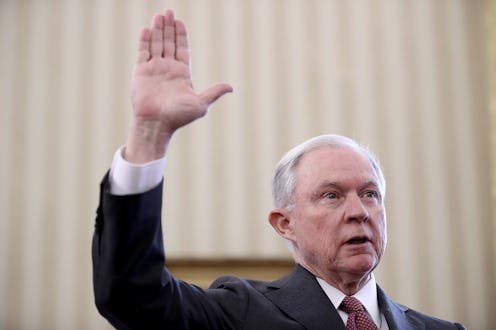News
People Are Claiming Sessions Committed Perjury

On March 1, the Washington Post reported that Attorney General Jeff Sessions met with Russia's ambassador to the United States in 2016 but didn't disclose those meetings to the Senate Judiciary Committee. Defense of Sessions has centered on the fact that he was specifically asked about communication regarding the Trump campaign, not just communication with Russia in general. Since the report, though, several politicians from both major parties are calling for him to either recuse himself from investigations of Russian hacking or resign. But there may be a worse outcome for the Attorney General, as many are asking if Sessions committed perjury during his Senate confirmation hearings.
According to U.S. Code, anyone who supplies information or declares in any way anything that they know to be untrue is guilty of perjury and subject to a fine and/or up to five years in prison. And since the law applies to statements made verbally and in writing, Sessions could be accused of having perjured himself twice — once to Sen. Al Franken during his hearing and another time to Sen. Patrick Leahy who submitted written questions to Sessions.
On March 2, as members of Congress began calling for his recusal or resignation, Sessions told NBC News, "Whenever it's appropriate, I will recuse myself." However, he denied having met with Russian officials to discuss political campaigns, adding that allegations he did so "are unbelievable to me and are false."
Sessions' spokesperson released a statement saying that "there was absolutely nothing misleading about" his claim to have not met with Russian officials. His camp's reasoning is because the question posed during the confirmation hearings was in the context of the presidential campaign and not his position as a senator and Armed Services Committee member.
But those calling for his resignation, a group that so far is only made up of Democrats, aren't so sure. Many are focusing on the claim that Sessions' statements denying contact with Russian officials were under oath and without clarification.
It still remains to be seen if charges of perjury will be filed against Sessions or not. But the ACLU is leading a call for an investigation into the allegations. The organization's Executive Director Anthony D. Romero stated:
If senators of both parties allow an attorney general nominee to plainly lie under oath with no repercussions, they will render our government’s cabinet confirmation process no more than kabuki theater. This matter must not and cannot be seen as a partisan issue, as it goes to the heart of the credibility of our democracy.
And as the Intercept's Lee Fang pointed out, 18 years ago Sessions might have agreed. The then-senator came out fully in favor of prosecuting Bill Clinton for allegedly committing perjury during his impeachment. And the Washington Post found even more examples of Sessions criticizing the Clintons for lying.
Ultimately, it's up to Sessions to recuse himself or resign. It's up to Trump to fire him. And it's likely up to the FBI to investigate Sessions for perjury. What's sure for now is everyone is watching what government officials' next moves will be.